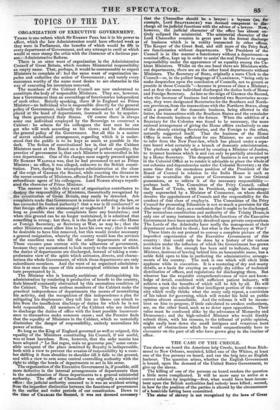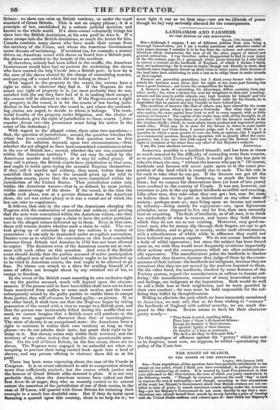THE CASE OF THE CREOLE.
THE slaves on board the American brig Creole, bound from Rich- mond to New Orleans, mutinied, killed one of the Whites, at least one of the free persons on board, and ran the brig into an English harbour. The question arises, whether the English Government is bound, upon the demand of the United States Government, to give up the slaves. The killing of one of the persons on board renders the question a little more complicated. It will be more easy to arrive at a correct solution by inquiring—first, what would have been incum-. bent upon the British authorities had nobody been killed ; second, in how far the position of the parties is altered by the circumstance of a homicide haling been committed. The status of slavery is not recognized by the laws of Great
Britain : no slave can exist on British territory, or under the royal standard of Great Britain. This is not an empty phrase ; it is a principle of law, established by a solemn judicial decision, and known to the whole world. If a slave-owner voluntarily brings his slave into the British dominions, at his own peril he does it. If a slave escape into the British dominions, so much the better for him. Canada contains many slaves who have made their escape from the territory of the Union, and whom the American Government never dreams of reclaiming. If accident (as, for example, a storm) drives an American vessel with slaves on board into a British port, the slaves are entitled to the benefit of the accident.
If; therefore, nobody had been killed in the scuffle, the American Government would have had no pretext for reclaiming the slaves who have carried the brig Creole into a British port : in how far is the case of the slaves altered by the charge of committing murder, and carrying off a vessel which did not belong to them ? With regard to the property in the vessel, the owners have a right to claim it wherever they find it. If the Negroes do not assert any right of property in it, (as most probably they do not, satisfied with the use they have had of it in making their escape,) the owners will be allowed to take it. If the Negroes assert a right of property in the vessel, it is for the courts of law having juris- diction in the harbour where the vessel is, and where the contend- ing claims are urged, to decide to whom it belongs. The terri- torial locality of the property under litigation, and the choice of the defenders, give the right ofjurisdiction to these courts. [Actor .sequitur forum rei—the prosecutor must bring his action in the court of the defendant.] With regard to the alleged crime, there arise two questions,— flrst, the question ofjurisdiction ; second, the question whether the crime has been committed? The first question must be first decided. Its solution depends upon two circumstances,—first, whether the act alleged to have been committed constitutes a crime in the eye of British law; second, whether the act was committed within the American territory ? The act may be called by the Americans murder and robbery, or it may be called piracy. If they call it piracy, the British courts have jurisdiction in that case, and ought to insist upon trying the accused Negroes themselves : if they call it murder and robbery, they must, before they can establish their right to have the accused given up for trial in American courts, prove that the acts were committed within the jurisdiction of the United States. That jurisdiction exists only within the American waters—that is as defined by moat jurists, within cannon-range of the shore. If the vessel, at the time the scuffle took place, was at a greater distance from the American shore, the act was either piracy or it was a venial act of which the law can take no cognizance.
It follows, that only in the case of the Americana charging the Negroes with the commission of murder and robbery; and proving that the acts were committed within the American waters, can they under any circumstances urge a claim to have the active participa- tors in the alleged crimes delivered up to them. Even in that case, there still remain doubts whether such a claim be valid. The mu- tual giving up of criminals by any two nations is a matter of concession : it can only be demanded under an explicit convention. Doubts exist as to whether the convention on this head concluded between Great Britain and America in 1795 has not been allowed to expire. The decisions even of the American courts are at vari- ance with each other on this question. And even if the British court should decide that the parties accused of active participation in the alleged acts of murder and robbery ought to be delivered up to be tried in American courts, the rest ought to be allowed to go free. No blame can attach to a slave for availing himself of a state of affairs not brought about by any criminal act of his, to escape to freedom. In the event of the British court asserting its own exclusive right to try the parties accused, much will depend upon the circum- stances. If the person said to have been killed shall turn out to have been murdered from malice or some such motive, and the vessel subsequently seized by the guilty parties to enable them to escape from justice, they will of course be found guilty—as pirates. If, on the other hand, it shall turn out that the Negroes began by taking possession of the vessel with a view to escape to a British port, and that the person was incidentally killed during the scuffle that en- sued, we cannot imagine that a British court will attribute to the act any more aggravated character than that of manslaughter. The state of slavery is an exceptional state : the Americans have a right to maintain it within their own territory as long as they please—we do not admire their taste, but grant their right to in- dulge in it. But slavery exists only within their territory, and the territory of any other nation that upholds this questionable prac- tice. On the soil of Great Britain, on the free ocean, there are no slaves. The Negroes were engaged in no unlawful act when at- tempting to prevent their being carried back again into a land of slavery, and any person offering to obstruct them did so at his Peril. There has been some vapouring about the case of the Creole in Congress. It is an event calculated to add to exasperation already more than sufficiently excited ; but the course which justice and the honour of Great Britain alike demand is plain. It is not very
Mble that, when the American orators have talked out their eyer-fit of anger, they who so recently carried to its utmost extent the assertion of the jurisdiction of one of their courts, in the case of M‘Lzoo, will quarrel with Great Britain for imitating their example in a much less doubtful case. But if they do insist upon fastening a quarrel upon this country, there is no help for it ; we
must fight it out as we best may—nor are we (friends of peace though we be) very seriously alarmed for the consequences.



























 Previous page
Previous page